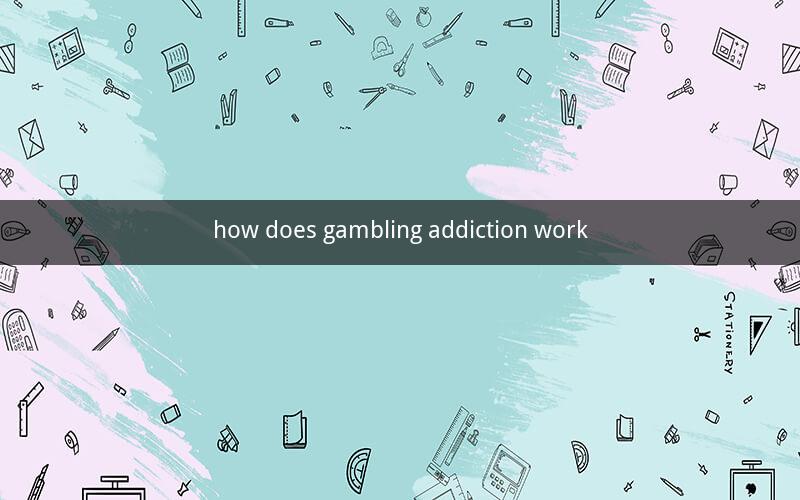
Table of Contents
1. Understanding the Concept of Gambling Addiction
2. The Brain's Response to Gambling
3. Signs and Symptoms of Gambling Addiction
4. Risk Factors and Causes of Gambling Addiction
5. The Impact of Gambling Addiction on Individuals and Society
6. Treatment and Support for Gambling Addiction
7. Prevention and Education
8. The Role of Technology in Gambling Addiction
9. The Legal and Ethical Implications of Gambling
10. Case Studies and Personal Stories
---
1. Understanding the Concept of Gambling Addiction
Gambling addiction, also known as problem gambling or compulsive gambling, is a behavioral disorder characterized by an inability to control the urge to gamble despite harmful consequences. It is a complex condition that affects individuals of all ages, backgrounds, and socioeconomic statuses.
2. The Brain's Response to Gambling
The brain's reward system plays a crucial role in the development of gambling addiction. When a person gambles, the brain releases dopamine, a neurotransmitter associated with pleasure and reward. This release creates a sense of euphoria and reinforces the behavior, leading to a cycle of increased gambling activity.
3. Signs and Symptoms of Gambling Addiction
Recognizing the signs and symptoms of gambling addiction is essential for early intervention. Common indicators include:
- Inability to control gambling behavior
- Preoccupation with gambling, even when not gambling
- Needing to gamble with increasing amounts of money to achieve the same thrill
- Feeling restless or irritable when attempting to stop gambling
- Continuing to gamble despite knowing the negative consequences
- Lying to family, friends, or therapists about gambling activities
- Using gambling as a way to cope with stress or other negative emotions
4. Risk Factors and Causes of Gambling Addiction
Several factors contribute to the development of gambling addiction, including:
- Genetic predisposition
- Personality traits, such as impulsivity and thrill-seeking behavior
- Environmental factors, such as exposure to gambling at a young age or living in a culture that promotes gambling
- Mental health issues, such as depression, anxiety, or substance abuse disorders
5. The Impact of Gambling Addiction on Individuals and Society
Gambling addiction can have devastating consequences for individuals and society. For individuals, it can lead to financial, emotional, and social problems, including:
- Financial ruin
- Relationship breakdowns
- Legal issues
- Mental health issues
- Suicidal thoughts
Societally, gambling addiction can result in:
- Increased crime rates
- Decreased productivity
- Higher healthcare costs
- Increased demand for social services
6. Treatment and Support for Gambling Addiction
Treatment for gambling addiction typically involves a combination of therapy, support groups, and lifestyle changes. Common treatment approaches include:
- Cognitive-behavioral therapy (CBT) to address underlying issues and develop coping strategies
- Family therapy to improve communication and support the individual in recovery
- Support groups, such as Gamblers Anonymous, to provide peer support and share experiences
- Medication to treat co-occurring mental health disorders
7. Prevention and Education
Preventing gambling addiction involves education and awareness. Schools, communities, and workplaces can implement programs to educate individuals about the risks of gambling and promote responsible gambling practices.
8. The Role of Technology in Gambling Addiction
The rise of online gambling and mobile apps has made it easier for individuals to access gambling opportunities, potentially increasing the risk of addiction. It is crucial for individuals to be aware of the potential dangers of technology-driven gambling and to use it responsibly.
9. The Legal and Ethical Implications of Gambling
The legal and ethical implications of gambling are complex. While gambling is legal in many jurisdictions, it is essential to regulate it to protect individuals and society. This includes ensuring fair play, preventing underage gambling, and addressing problem gambling.
10. Case Studies and Personal Stories
Personal stories and case studies provide valuable insights into the experiences of individuals with gambling addiction. They can help raise awareness and encourage individuals to seek help.
---
Questions and Answers
1. Q: What is the primary neurotransmitter involved in the brain's response to gambling?
A: Dopamine is the primary neurotransmitter involved in the brain's response to gambling.
2. Q: How can genetics contribute to the development of gambling addiction?
A: Genetic predisposition can make individuals more susceptible to the development of gambling addiction, particularly if they have a family history of addiction.
3. Q: What are some common signs of gambling addiction?
A: Common signs include an inability to control gambling behavior, preoccupation with gambling, and lying about gambling activities.
4. Q: How can treatment for gambling addiction help individuals recover?
A: Treatment can help individuals develop coping strategies, address underlying issues, and provide support through therapy, support groups, and lifestyle changes.
5. Q: What role does technology play in the development of gambling addiction?
A: Technology makes it easier for individuals to access gambling opportunities, potentially increasing the risk of addiction.
6. Q: How can education and prevention programs help reduce the incidence of gambling addiction?
A: Education and prevention programs can raise awareness about the risks of gambling and promote responsible gambling practices.
7. Q: What are some legal and ethical considerations regarding gambling?
A: Legal and ethical considerations include ensuring fair play, preventing underage gambling, and addressing problem gambling.
8. Q: Can gambling addiction be treated successfully?
A: Yes, gambling addiction can be treated successfully with the right combination of therapy, support, and lifestyle changes.
9. Q: How can individuals seek help for gambling addiction?
A: Individuals can seek help through therapy, support groups, and resources provided by organizations specializing in addiction treatment.
10. Q: What is the importance of sharing personal stories and case studies in addressing gambling addiction?
A: Sharing personal stories and case studies can raise awareness, provide hope, and encourage individuals to seek help.